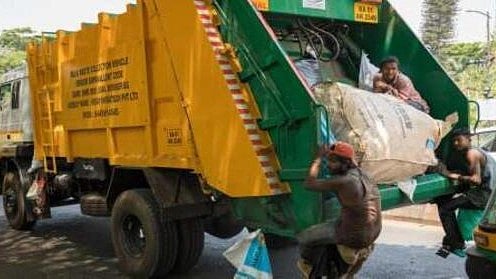
The court directed establishment of an integrated technology-driven solid waste management governance framework for Bengaluru contextual foundation.
Credit: DH photo
Bengaluru: The Karnataka high court has directed the establishment of a single, unified and integrated digital platform for Solid Waste Management for the city of Bengaluru. The directions are issued taking judicial notice of the persistent and widespread failure of the authorities to effectively implement the statutory framework governing municipal solid waste management (SWM), the court said.
“This unified platform is mandated to avoid the creation of multiple, fragmented applications or portals for different SWM services. The governing principle for this initiative shall be "One City, One Platform" for all SWM-related interactions, ensuring a seamless and coherent experience for citizens, operators, and administrators alike,” Justice Suraj Govindaraj said.
The directions were issued while dismissing the petition filed by municipal solid waste management contractors challenging the July 30, 2025 tender in respect of 33 packages. The court rejected their contention that the change of the tender from ward-wise to multiple wards was arbitrary and made only to favour larger contractors.
The directions:
The court directed establishment of an integrated technology-driven solid waste management governance framework for Bengaluru contextual foundation. “It is hereby directed that the Chief Commissioner of the Greater Bangalore Authority (GBA), along with the Zonal Commissioners of each of the corporations coming under the GBA, with the assistance of the Principal Secretary, e-Governance Department, Government of Karnataka, shall forthwith commence the design, development, and implementation of a single, unified, and integrated digital platform for solid waste management for the city of Bengaluru,” the court said.
The court directed for setting up of the digital dashboard with mobile application, GPS tracking, weighbridge integration, and CCTV surveillance, not to be viewed as separate or standalone projects.
“They are intrinsically linked components of a single, cohesive governance ecosystem. The CCTV surveillance network shall function as a primary data-gathering and enforcement sensor network, feeding critical, real-time information directly into the analytical and operational modules of the unified digital platform. Citizen grievances about black spots lodged via the platform’s mobile application will inform the strategic deployment and monitoring focus of the surveillance system. Conversely, evidence of violations captured by the CCTV network will be processed, and penalties will be issued and tracked through the enforcement modules of the same digital platform,” Justice Suraj Govindaraj said.
The court further said, “This integrated architecture is fundamental to the success of the entire initiative, ensuring that data flows seamlessly from the "eyes" on the ground (CCTV, GPS) to the "brain" of the operation (the administrative dashboard) for analysis, action, and accountability.”
Committee to Oversee:
In order to oversee the implementation of the order, the court directed that a Nodal Oversight and Implementation Committee for SWM Surveillance shall be constituted by the Chief Secretary within 15 days.
“The committee will be chaired by the Chief Commissioner, Greater Bangalore Authority, and include the Zonal Commissioners of the five corporations under the GBA; the Managing Director and CEO of Bengaluru Solid Waste Management Limited, who will serve as Member Secretary; a senior officer of Deputy Commissioner of Police rank nominated by the Commissioner of Police, Bengaluru; a senior scientist or environmental officer nominated by the Chairman of the Karnataka State Pollution Control Board; a technical expert in large-scale CCTV surveillance, network architecture, and data management; an Additional Advocate General or the Chief Law Officer of the GBA to advise on legal matters; and any other persons the Chief Secretary deems fit. The committee must submit quarterly compliance reports,” the court said.
“The city of Bengaluru, despite its stature as a global metropolis, is plagued by the chronic issue of “garbage black spots,” which are areas of recurrent, unauthorised waste dumping that pose a significant and ongoing threat to public health and the urban environment. This Court is of the considered opinion that the management of solid waste is not merely a statutory duty of the municipal corporations but a profound constitutional obligation, inextricably linked to the fundamental Right to life under Article 21 of the Constitution of India,” Justice Suraj Govindaraj.